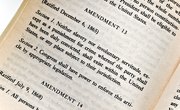What does it mean to be the President of the United States? The President is the head of the executive branch of the government. The main duty of the executive branch is to make sure the laws passed by Congress are put into effect. The Constitution of the United States specifically express the powers of the President so that he may fulfill his duty as leader of the country.
Command the Military
The President is also the Commander in Chief of the United States Armed Forces. This is the highest ranking officer of the military branches. When men and women enlist in the military, they must take an oath to obey the orders of the President. The President can issues orders to deploy troops overseas, but must get the approval of Congress to declare war.
Grant Reprieves and Pardons
Except in the case of impeachment, the President has the power to grant reprieves and pardons to people for federal crimes. A reprieve temporarily postpones punishing a person for his or her crimes while a pardon forgives the crime and the penalty for the crime. Reprieves and pardons do not need the approval of Congress. Many presidents issue pardons as they exit the office.
Make Treaties
The Constitution grants the President the power to make treaties, or formal agreements, with other nations. These treaties might take place as the ending points for wars or conflicts. The President must receive consent from two-thirds of the Senate to make a treaty official and actionable.
Appoint Ambassadors and Officers
The President's appointments can include public ministers and consuls, ambassadors to foreign countries, Supreme Court justices, cabinet members, U.S. attorneys and judges, and all officers whose appointments are not otherwise provided for in the Constitution. Some of the presidentially-appoint positions also requires the candidates to go through the Senate confirmation process.
Grant Commissions and Call Special Sessions of Congress
The President also has the power to fill vacancies that may happen during a Senate recess. These commissions expire at the end of the next Senate session. On extraordinary occasions, the President can convene and adjourn both houses of Congress, or either of them as he sees fit to serve the needs of the country and any commissions that require their confirmation.
Approve or Veto Bills
The Constitution grants the President the power to approve bills of legislation submitted by Congress into law. If the Presidents objects to a bill's contents, the Constitution states that he may veto the bill and send it back to Congress. A bill that receives at least a two-thirds majority vote in the Senate is considered veto-proof and can not be overridden by the President.
Related Articles
References
Writer Bio
Julie Klein has been writing web content since 1999. Her writing includes admissions copy for a major university and articles on technology, literature, education and crafts. Klein received a Bachelor of Arts in English and a Secondary English Education Certification in 2004 from the University of Findlay.











